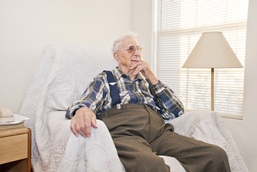Tackling isolation of male residents in a female dominated care home environment
With nearly 400,000 people now in care homes, the focus on care home staff to ensure residents receive individualised quality care is mounting.

In a recent survey published by the National Care Forum (NCF) care home manager’s ranked quality of care as their top priority for the third consecutive year running.
Some care homes have started introducing male only units and to help both older men living with dementia and younger men with disabilities receive quality care and the privacy and respect they require.
Dedicated men’s clubs and groups for male residents to take part in are also increasing in care homes, tackling the loneliness men can feel in an often female dominated care home environment.
Nick Holman, manager of Talbot View Care Home in Bournemouth said: “When running a care home, you tend to find that a large proportion of residents with dementia are female and that can lead to some men feeling isolated.”
Care homes are introducing men only wings and clubs to their homes to provide a community for men to be part of which addresses their needs specifically.
Talbot View in Bournemouth has a 13-bed dementia unit specifically for men. Mr Holman said: “In Butlers Brook, there’s a real community spirit among the gentleman and they really enjoy each other’s company.”
The male only dementia unit has been decorated with male residents in mind, and activities are tailored to the hobbies residents describe enjoying in their youth.
Richard Hawes, director of Care Services at Care South, who own Talbot View said: “This dedicated unit, which was founded in 2009, has been recently renovated, with masculine touches visible in everything from the décor to the activities programme.
“At Care South, we work hard to ensure we are offering residents care that is tailored to their particular needs. Butlers Brook offers male residents targeted care, as well as a unique ‘gentleman’s club’ environment that they respond well to.
“Staff organise activities that the gentleman will enjoy, as well as ensuring they take part in activities involving all of our residents and remain integrated within the home as a whole.”
“Paintings and photographs in the communal areas follow a transport theme and decorative ornaments reflect those typically found in a gentleman’s study, creating a homely feel.
“Residents show a real sense of pride in their surroundings and staff have noticed a calming effect on the residents as a result.
“Activities are also tailored for male residents. Residents enjoy easy access to the garden, complete with a potting shed, and are invited to help out with painting garden furniture. Regular daytrips out in the minibus – including visits to The Tank Museum in Dorset and Bournemouth Flying Club – are always popular among the residents.
"Butlers Brook also holds fish and chips evenings and sherry mornings, where the gentlemen can socialise together, as well as playing games of darts, skittles and indoor bowls.”

This year the National Care Forum ballot, which shows the priorities of care home managers, included ‘arts and creativity’ in the top ten as well as ‘delivering person centred care and support’ which is reflected in the influence residents are increasingly having on the way the home is run and activities offered.
Nick Humphrey, maintenance coordinator at Weybridge of Sunrise Senior Living, has been running a gentlemen’s only club at the home for over a year.
He has arranged wine tasting trips and pub outings as well as a trip to the British Airways headquar-ters to take some of the male residents to the BA archive collection.
Mr Humphrey said: “I think the men who attend enjoy having the club that they know is just for them and look forward to knowing they will be able to do something different when we meet.
“It’s a lovely opportunity for the men at the community to get together and talk over a few drinks.
“Often they talk about themselves, what they used to do for a living and their families.
“Some like talking more than others; we generally have around eight men attending regularly.
“We try to meet once a month to have a general chat and plan for our next outing with a trip out or event every second month.
“They certainly enjoy it and like to be able to get out and about and do something a bit different, other than the normal outings that are available to all.
“We are very keen to keep the club going here at Sunrise of Weybridge.”
However it is not only to ensure male residents can socialise regularly, that men only groups and units can be beneficial.
Mr Hawes, of Care South said: “For some gentlemen living with dementia, managing relationships can become difficult and lead to behaviours that challenge others within a unisex setting. This can often escalate and lead to individuals being labelled as ‘aggressive’ or ‘predatory’.

“Establishing a male only dementia unit is about providing an environment in which gentlemen can live at ease and manage their lives in a positive and productive way, with dignity and respect.”
For Chris Hughes, the service director of Lighthouse-healthcare, a group providing residential care for adults with learning disabilities, autism, mental health problems and personality disorders, the importance of mixing genders during social activities is essential for preparing them for more independent living.
He said: "The focus at Lighthouse is to support individuals to move on and we help them to prepare for the real world where they will be in contact with people of the opposite sex every day.
“Therapeutic inputs can focus more on gender specific issues, but during social activities and community engagement people are encouraged to spend time in mixed gender groups and settings.”
However he agreed there is a need to offer male only houses to protect the privacy and dignity of men using the service.
He described why some male only houses are beneficial and said: “One of the main considerations for providers is to protect resident’s privacy and dignity and some younger service users have issues sharing with people of the opposite sex, so it suits many.
“Unfortunately some residents have also had bad experiences in mixed settings and so are more comfortable in single sex accommodation.
“The compatibility of the people living together in our services plays a big part in our work as providers, their psychological, clinical and social needs all need to be considered.
“Some service users struggle with issues around relationships and sexuality, so single gender care homes have many advantages in these circumstances.
“For a lot of individuals, once they move in to a service there is a period of adjustment and having single gender homes can help to make the transition period be less anxious.”
Ian Fraser, resident at Sunrise of Weybridge, described his positive experiences of the men only club at his care home: “I have found the past few years with the Men’s Club thoroughly enjoyable, the group has discussed many things and told a few corny jokes, but the best part has been the presentations and visits we have enjoyed.
“Our tips have included an interesting visit to the British Airways (BA) museum, were we heard a presentation about the history of BA, which included, types of planes used, uniform, plane interiors, and seating design.
“We were also treated to an excellent presentation from a wine merchant who gave a brief overview about wine and let the group taste a number of red and white wines.
Mr Fraser concluded: “I’m looking forward to our next trip - to the Fullers brewery in Chiswick.”
Latest Features News
 25-Nov-19
2019 Election: Boris Johnson leaves social care in 'too difficult box' but Labour vows to end 'crisis'
25-Nov-19
2019 Election: Boris Johnson leaves social care in 'too difficult box' but Labour vows to end 'crisis'
 18-Oct-19
Podcast: Wendy Mitchell and dementia: 'My biggest fear is not knowing who my daughters are'
18-Oct-19
Podcast: Wendy Mitchell and dementia: 'My biggest fear is not knowing who my daughters are'
 27-Sep-19
Exclusive: Care minister backs care workers' call for time off to grieve and attend funerals
27-Sep-19
Exclusive: Care minister backs care workers' call for time off to grieve and attend funerals
 19-Sep-19
Podcast: Gyles Brandreth says poetry helps ward off dementia
19-Sep-19
Podcast: Gyles Brandreth says poetry helps ward off dementia
 30-Aug-19
Edinburgh Fringe funnyman joins comics facing toughest audience at care home gig
30-Aug-19
Edinburgh Fringe funnyman joins comics facing toughest audience at care home gig